
by Michael | Aug 3, 2020 | Blog
It would be nice, if I could offer a brief, succinct, clear update on the current situation as regards weddings. As with so many rulings currently, it’s just not as simple as that!
Legal Ceremonies
A Court very recently decided that humanists should be able to conduct legal weddings. It was felt that they had suffered discrimination and should now be free to proceed – but the decision would remain in the hands of the government.
A Law Commission review is due to be published next month. Part of that review is considering whether civil celebrants, in addition to humanists, can be allowed to conduct legal weddings.
This may seem relatively insignificant, but the proposed change should be for the better in the long run and offer couples greater choice.
Legal Weddings
There is a certain amount of confusion regarding the new announcement that weddings at venues are now allowed, but that there can be no reception.
It must be made clear that weddings conducted by civil celebrants are not currently classed as “legal”.
However, that doesn’t prevent you from holding a celebrant wedding ceremony! This needs to be part of the reception or party after the (legal!) wedding. How practical is this, I wonder, especially as it is unclear whether this is law or guidance?
My feeling is that it is probably best to wait until after 15th August to hold a gathering. The limit of 30 will still apply, but a service can then be held in an open space. This is dependent on there being only two family bubbles present. The civil celebrant counts as one bubble, and so would a photographer, say!
Could we have a situation where a photographer records the celebrant conducting a wedding for a couple who aren’t even allowed to be there?!
What a strange world we’re living in at the moment!
Anyway, I hope I’ve cleared all that up for you now …!
Photo: iandooley on Unsplash
by Michael | Aug 8, 2017 | Blog
Let me not mislead you! “Marriage mishaps” do not mean marriages that break down. Rather, I am referring to mishaps that occur at weddings.
A few examples
The idea for this blog came yesterday, when I arrived an hour early to conduct a wedding in Enfield. Smoke was billowing from a courtyard at the venue, and the fire brigade had to be summoned. Obviously, nobody was allowed into the building, which potentially affected my preparations, as well as the caterers’ and sound operator’s etc.
The firemen were soon on the scene. (Fortunately, nobody was injured and minimal damage incurred.) However, it was almost time for the ceremony to begin before they cleared us to enter. I had started making arrangements for an impromptu open-air ceremony (it was a lovely afternoon), but I wasn’t sure how well older people would react, if there were no chairs available.
Fortunately, it never came to that.
Have I witnessed other mishaps in my four year plus career as a celebrant?
I’ve probably been lucky, but I can only think of two real misadventures.
One came when the Best Man had to attend a job interview, and then got caught in serious traffic on the M25. Explanations were offered, and most people were not averse to having a drink or two earlier than they had bargained for! No real hardship there, even though we started 1.5 hours late!
I don’t really count this, but the bride came late to a wedding in Brixton. Nothing new, surely? However, apparently she was punctual to a fault. Her driver had got lost, and, and could not be contacted (broadband problems). The groom was beginning to sweat, as he believed he was being dumped at the altar, but madam burst in about half an hour late.
Otherwise, at one of my first weddings, the groom turned up very early (as did I). When I asked in a jocular fashion whether he had brought the rings, he turned pale. He had forgotten them in his hotel!
Luckily, the hotel was nearby and, partly because the bride would arrive late, he was able to retrieve the rings on time, and the day was saved!
Prevention
How do you prevent mishaps at a wedding?
Well, of course, like anything else, oversights or plain bad luck can be rife. No one can guarantee a smooth, flawless ceremony, even if the best wedding planner in the world is working for you.
However, you can minimise risk. Preparation is key.
Whether you use a wedding planner or are organising things yourself, start well in advance. It’s also worth confirming all the suppliers (venue, civil celebrant, caterers, florist, photographer, etc.) and even those in the bridal party. Do this a week to ten days before the big day, so there’s time to iron problems out.
If you’ve chosen your suppliers carefully (and I have often blogged about this), you should be safe, even though human error or acts of God cannot be ruled out entirely.
However, these mishaps tend to be the exception, rather than the rule, so don’t worry about them! If you have a professional looking after the arrangements (such a wedding planner or civil celebrant), then things can usually be smoothed out quickly and with a smile.
But, even if things go wrong, most people will be on your side, and not gunning to criticise you!
Relax and enjoy!
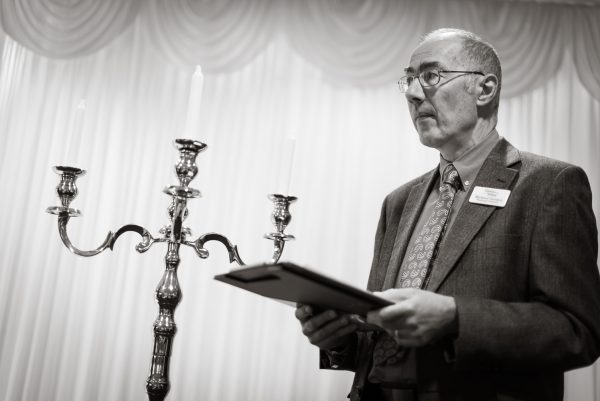
by Michael | Jun 13, 2017 | Blog
“I don’t mean to be rude, but do we actually need civil ceremonies?” The question emerged over networking when a lady I had just met found out what I did for a job.
No offence was intended, or taken. And, to some extent, she had a point.
A religious society
After all, over 50% of the UK population consider themselves Christian (according to recent research). So why would they need civil ceremonies at all? A little over 25% professed no religion. So they’ve got the option of a secular ceremony at the register office. OK, that leaves some people out, but it does cover most people.
But hold on a moment!
Religious objections
Not everyone who claims to be “religious” wants a full, standard religious ceremony, do they?
And what do you do, if you do want a religious ceremony, but are marrying someone of a different faith? Church isn’t an option, if you are Catholic and divorced. What if your church won’t accept you because you’re gay? And what if a religious service doesn’t really rock your boat, but do want a blessing or a prayer (mainly to keep parents happy, say)?
The secular option
In all those cases, when the Church won’t provide what you want, you have to turn to the Register Office. There they will read out the standard, necessary words to make your marriage legal. But, unfortunately, the ceremony must be totally secular (and impersonal). It can be a bit of a conveyor-belt operation.
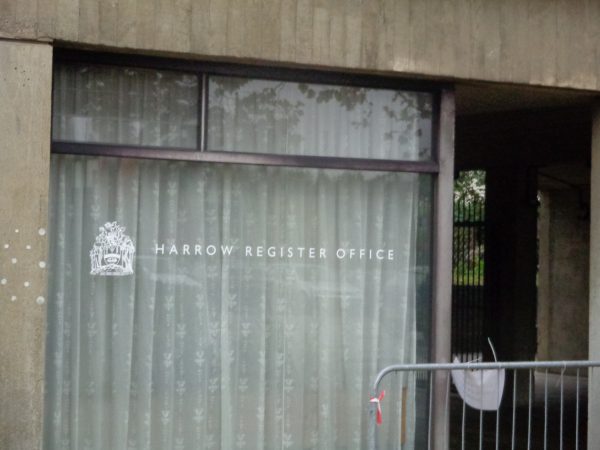
In surroundings that may not be much to write home about!
So, I hear you ask, is there another option?
A real choice
Indeed. As I explained to the lady, that is where a civil celebrant comes into his or her own.
The assets of a civil celebrant are that they build a ceremony from scratch. A good celebrant takes the time to work with the clients to offer ideas and also guidance about what is possible and might work. He will ask questions (and supply answers too), so that he can build up a full picture of what the couple wants. He will then write or compile a ceremony that reflects their personalities and beliefs, and is everything they want it to be.
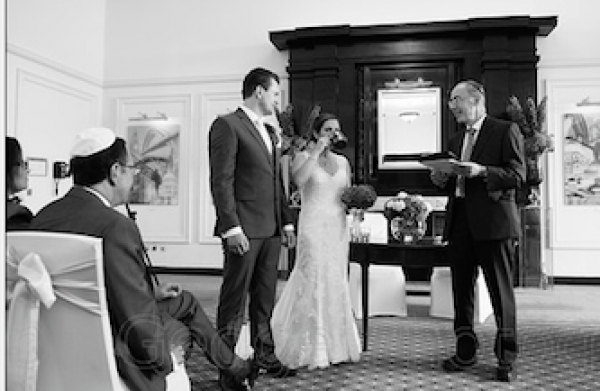
Photo courtesy of Philippa Gedge
Not only will the ceremony be personalised and unique but it will tick the other box: it can be as religious as the couple want it to be.
It should be pointed out that civil celebrants are not (yet) licensed to conduct legal marriages, so the registrar ceremony is still compulsory. However, once the legal formalities are over, you can enjoy a fabulous meaningful ceremony that will be memorable for all the right reasons!
I believe, after our conversation, that that lady understood my role a bit better – and didn’t regret her question too much!
Of course, if any reader wants to follow up with me, I’d be delighted to explain more. Please feel free!
by Michael | Oct 11, 2016 | Blog
Not everybody wants a conventional wedding!
I’ve put together, and officiated at, a few unusual ceremonies – atop an Iron Age fort, a handfasting at Stonehenge, a house blessing , a (colour) green-themed funeral… However, I have not had the pleasure of conducting a ghoulish ceremony!
Of course, with Halloween approaching, my thoughts have turned to things that go bump in the night, the Undead and nasties in general. How about incorporating these into a wedding, say?
Would anyone actually want to adopt a Halloween theme for the biggest day of their life, though?
Not everyone, no, but evidently the answer is “yes”. It happens. Goth weddings are not uncommon. But why on earth (or under the earth?!) would you want to have a ghoulish theme?
A growing number of people nowadays don’t see a wedding as a solemn affair. They want to include humour (to reflect their own personality), their choice of music can be eclectic, to say the least. They want to choose their venue, and that might be quite way-out – under water, in a hot-air balloon, on a mountain top, wherever your imagination might take you.
A lot of people choose themes for their wedding. Often it’s Star Wars or Elvis. It can bring smiles to faces and is a peephole into the couple’s personalities. Why not extend it to the Dark Side, if that’s what turns the couple on?
The important thing to realise is that, when planning a wedding, you are not restricted to a religious church ceremony, say, if you don’t want it. You have a choice. If that choice is a little bit wacky, why shouldn’t it be? (I’ve also seen a bit of wackiness in funerals, so surely that is justified in happier occasions?)
So go with the flow, let your imagination be your guide (but check with your partner first!) and have a simply unforgettable ceremony!
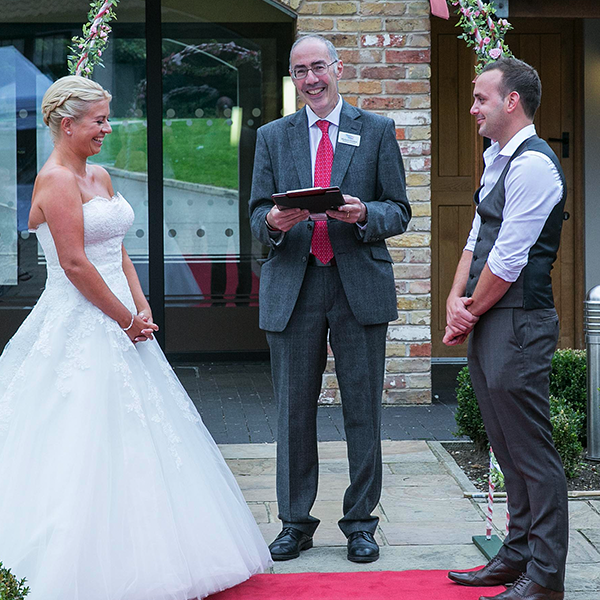
by Michael | Sep 15, 2016 | Blog
People don’t really clock what a civil celebrant can do for them. It’s inexplicable to them.
Celebrants have been practising for well over 15 years in this country. Numbers are growing. There are now a variety of umbrella organisations (like the AOIC) , who do their best to publicise and support the profession.
Nonetheless, the majority of people have no idea, or, at best, only half an idea, how we might be able to benefit them.
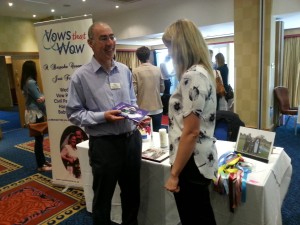
One of the best ways to spread the word is through face-to-face meetings. I regularly display at wedding fairs and even business shows. I don’t normally get any direct business, but I sow some seeds and, at least, educate people that there is a choice out there.
Better still, I show people the benefits when I get invited to conduct ceremonies. They are often amazed that my ceremony actually wasn’t as bad as they had expected. In fact, it might even have been rather good!
Another useful step is to publish testimonials from satisfied customers. This often reveals the service I can offer better than my words can! After all, the customer knows what they were expecting and wanting. They can evaluate and appreciate how it was achieved.
Here’s a brilliant example from a wedding I conducted (at quite short notice) just last week:
“Michael conducted an absolutely incredible wedding ceremony for us. I have since lost count of the number of guests who have commented on how good he was and what a fantastic service he delivered. Many asked whether he was in fact a close friend of the family, because of the warmth and delivery of the service. Ahead of the ceremony we had several Skype calls to go through everything which worked really well. He even read out a welcome in both Swedish and German, for family who’d travelled from abroad. Above all he gave us total confidence in his attention to detail and great suggestions, that he’d be conducting the service the way that we had wanted it to be. It was extremely special and personal and the way he delivered it was perfect with just the right balance of formal (we couldn’t hold back the tears) and uplifting (where everyone was laughing out loud). We couldn’t recommend him more highly.”
My belief is that, by reading something like that, you will get a better idea of how I can make your ceremony special rather than through any other method. (Do you agree?)
Be that as it may, I sincerely hope that you may be prepared to share this article and help to spread the word. A civil ceremony is not for everyone, but there are so many people who could benefit from a celebrant’s services (if only they knew they existed).
To sum up, celebrants offer true and free choice.
Maybe that’s not so inexplicable, after all!






